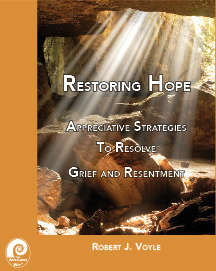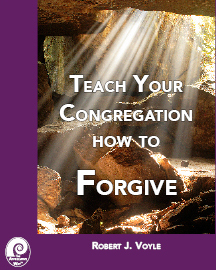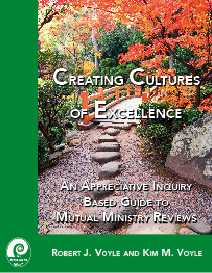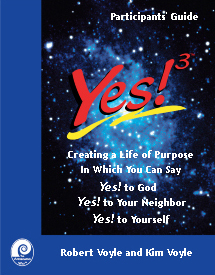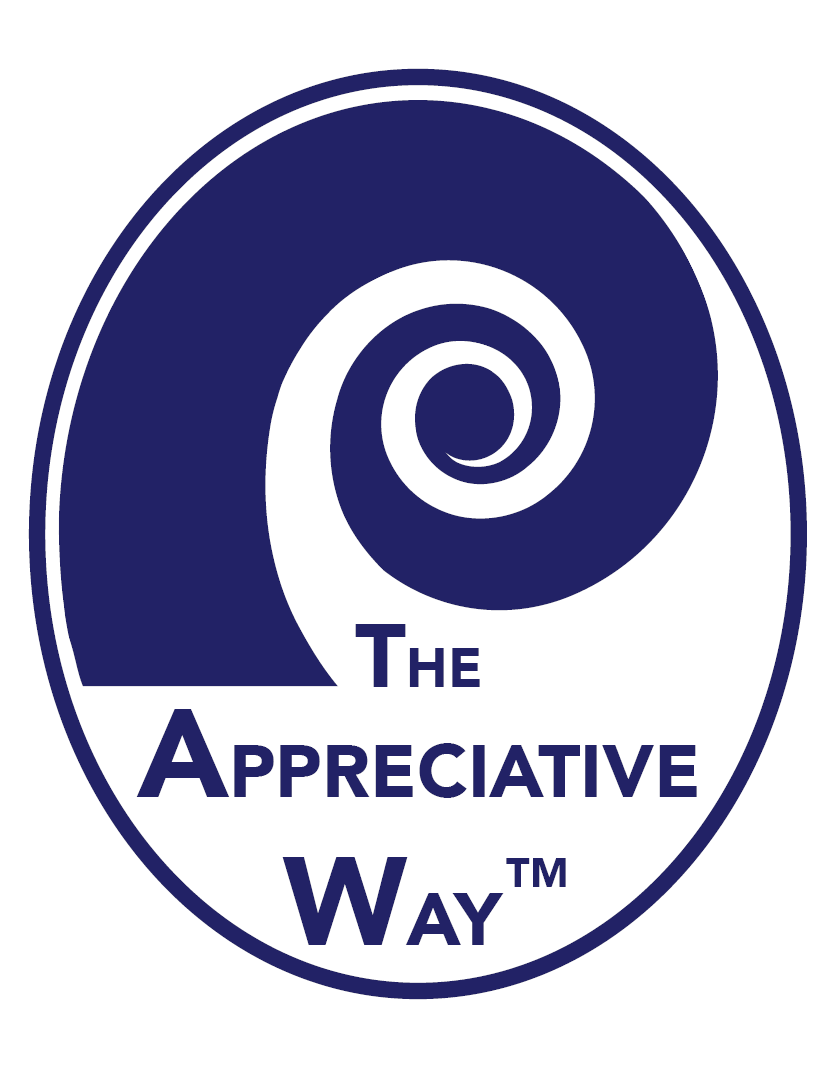

Restoring Hope
Practical Appreciative Inquiry based strategies to effectively resolve grief and resentment.
The Appreciative Way
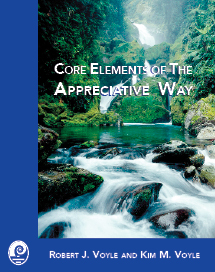
Discover the essentials of the
Appreciative Way in this fast
read format book by
Rob and Kim Voyle.
Teaching Congregations
How To Forgive
Teaching Forgiveness
- Practical Processes to Teach People How to Forgive
- Five Sermon Outlines
- Five Adult Forums with Exercise Protocols and Scripts
Creating Cultures
of Excellence
Appreciative Inquiry Based Guide to Mutual Ministry Reviews
- Templates and Worksheets
- For Congregations
- Individual Performance
- Coaching Strategies
Welcome to Yes!3
Yes!3 is designed to help you
grow an appreciative culture
within your congregation by
helping parishioners create
a purpose centered life
in which they can say:
Yes! To God
Yes! To Their Neighbor
Yes! To Them Self
Stay Connected
Receive The Appreciative Way our Free Email Newsletter
and receive advance notice of future programs.
Privacy: We never rent, sell, or share your email.
Learn Advanced Coaching Strategies to:
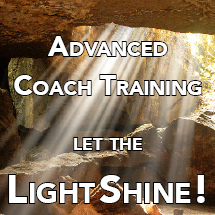
- Resolve Resistance to Create Sustainable Outcomes
- Re-Create a Healthy Self Image
- Live and Work From a Place of Purpose and Passion
- Moved from Stuck Places to Resourceful States
- Resolve Performance Limiting Critical Voices
- Restore People to Love and Hope
This program will teach you how to resolve many
performance limiting challenges clients face.
Training Schedule: Advanced Appreciative Coaching
No Advanced Appreciative Coaching workshops are scheduled at this time.
Please see training schedule for a complete listing of all training programs.
Advanced Appreciative Coaching
This 5 day program concludes the Certificate in Appreciative Coaching.
This five day program is also presented, and may be completed, in two 2.5 day parts as:
- Returning to Love: Appreciative Strategies to Grow from Fear to Love
- Restoring Hope: Appreciative Strategies to Resolve Grief and Resentment
While it would be preferable to attend the Introduction to Coaching prior to taking this class clergy, therapists, and spiritual directors can take this class as an independent class.
Recommended Text
A large part of this program is based on Rob Voyle's book Restoring Hope: Appreciative Strategies to Resolve Resentment and Grief. You can purchase it a the The Appreciative Way Bookstore.
This program also makes extensive use of the work of Steve Andreas. Our recommended Text is Transforming Yourself: Becoming who you want to be, by Steve Andreas. Published by Real People Press in 2002. It is available from the publisher. They often have restocked books at reduced prices.
Course Description
Please Note: This training program is highly experiential in nature. Participants will learn the advanced coaching strategies by applying them first to themselves and then by coaching others through them. Participants must be willing to personally engage in these exercises during the training.
Program Content and Focus: Imagineering
Since coaching is about creating a preferred future and everything we think about the future is an act of pure imagination, coaching often involves helping a client to use their imagination to rehearse and create their desired outcomes. In this advanced coaching class we focus primarily on learning the techniques and strategies of imagineering or how to help clients change both the content and the structure of their experiences to develop their internal resources as they work to create their desired future.
The term "Imagineering" was first used by Walt Disney in describing the work of the imagination in the creative process. It has subsequently been used by coaches to describe the techniques of using and restructuring the imagination in role rehearsal and practice exercises.
The Structure of Experience
There are two major aspects to the way people process, store and retrieve their experiences: the content of their experience and how they structure or represent the content. For example: when a preacher says "I can't imagine being able to preach like that," there are two things for the coach to pay attention to: "what" the person is trying to imagine (preaching in a certain way) and "how" they are actually trying to imagine preaching in a certain way. Some preachers might be relying on visual images of themselves preaching whereas others may be relying on auditory images and actually be imagining hearing them self preach. A more accurate statement of "I can't imagine being able to preach like that," would be: "I can't see myself being able to preach like that," or "I can't hear myself being able to preach like that."
Similarly we have often heard people say something like:
"I know it in my head but I need to know it in my heart!"
In this example the client knows something (the content) and it is in their head (the structure) as intellectual knowledge. What they want is to restructure it as an experience in their heart. Most coaching is oriented toward modifying the content of a person's experience, yet in this example changing the content or what a person knows in their head will typically not result in a change in their desired heart felt sense of self. Just getting someone to think confident thoughts will not help a person to feel confident.
In this Advanced Coaching class you will learn and practice strategies to change the structure of client's experience to create fast and sustainable change.
Learning Objectives
Because this is a multi-day program specific learning objectives are provided for each day.
Specific Leaning Objectives Day 1:
Participants will be able to:
- Review and integrate skills and knowledge acquired in the Introduction to Appreciative Inquiry and Introduction to Coaching programs:
- Apply the Appreciative Way synthesis of Appreciative Inquiry, Milton Erickson's strategies of change, and Contemplative Spirituality to the task of executive and personal coaching:
- Distinguish coaching from psychotherapy, pastoral counseling, spiritual direction, mentoring, consulting, and knowing when to refer client's to competent professionals in these disciplines to help client's achieve their goals:
- Know the limits of your professional ability to coach ethically within the scope of your professional competence:
- Provide clients with informed consent, risks and benefits of coaching, limits of confidentiality, and potential need to refer to other professionals as part of developing a coaching contract:
- Use the A to B model of coaching to create specific positive coaching goals congruent with the client's values:
- Ensure that goals are ecologically sustainable with respect to the client's physical, psychological, and spiritual functioning and are just with respect to the external world the client inhabits:
Specific Leaning Objectives Day 2:
Participants will be able to:
- Identify whether a client needs to "grow" internal personal resources or develop and manage external resources to achieve their goals:
- Use the coaching spiral of resources to identify the most powerful domain of activity to access and associate internal personal resources to help clients grow and achieve their goals:
- Use the overt content and underlying assumption of questions to create and use powerful coaching questions:
- Paradoxically utilize the power of resistance to transform "stuck states:"
- Discover how clients uniquely organize and structure their internal experience such as memories of past experience and imagine their future:
- Use a variety of strategies to modify how clients structure their internal experiences to associate resources to personal challenges to create resourceful states and maximize performance:
- Apply appreciative coaching strategies to resolve distressing memories that impair current performance:
Specific Leaning Objectives Day 3:
Participants will be able to:
- Use appreciative coaching strategies to resolve grief:
- Use appreciative coaching strategies to resolve resentment:
- Use appreciative coaching strategies to resolve guilt and shame:
- Create internal resources to enable clients to remain grounded and engaged, rather than resentful or avoidant, in the presence of people who violate the client's values:
- Create resourceful states to resolve performance anxiety:
- Use appreciative coaching strategies to transform or resolve internal conflicts and critical voices that diminish performance:
- Use appreciative strategies to rebuild self-image and self-esteem following personal or professional failure:
Specific Leaning Objectives Day 4:
Participants will be able to:
- Discover and use an individual client's core passion and purpose and their spiritual understanding to create highly resourceful and motivated states:
- Identify patterns of transformation such as the "crazy wisdom" of Buddhist masters and know how to use them with clients:
- Use confusion to destabilize "stuck states" to create opportunities for transformation:
- Listen and directly respond to a client's idioms and metaphoric communication, especially in regard to client's communication about being stuck and unable to move:
- Know how and when to create and use client specific parables to create opportunities for transformation:
- Use the Metaphors of Movement coaching process described by Andrew Austin to expand the coaching understanding of "next steps" and "moving forward" to include the six possible directions a person may need to "take a step:"
- Discover and use a client's non-rational internal wisdom to discern future courses of action that are aligned with core values and purpose:
Specific Leaning Objectives Day 5: (half-day)
Participants will be able to:
- Design and use ambiguous exercises to create opportunities for synthesis and integration of client's coaching experiences, insights, and learning:
- Synthesize coaching knowledge into a congruent whole that has integrity with core values:
- Plan next steps and identify resources to achieve personal and professional coaching goals:
Who Should Attend This Program
Not Just For Clergy
Our Advanced Coaching Training is open to:
- Clergy who want to develop their coaching skills.
- Psychologists, Consultants, and Counselors who are also clergy or who work with clergy.
- Spiritual Directors and Chaplains
- Leaders who coach or mentor staff and volunteers.
- Psychologists, Counselors and Coaches who want to work as Executive or Life Coaches.
- Coaches who want to work in the business world in a way that honors their values and spirituality.
Continuing Education Credit
This program qualifies for 30 hours of continuing education credit.
Partial continuing education credit is not provided. You must attend all 30 hours to receive continuing education credit.
Workshop Format
The workshop will typically be conducted in a retreat setting with:
- Didactic presentations
- Experiential learning of specific approaches and strategies
- Personal practice and experience of appreciative process
- Time for personal reflection and meditation
- Corporate prayer
- Opportunity for creative reflection on the past and anticipation of the future
Typical Workshop Schedule:
The following is a typical workshop schedule. The exact schedule may vary depending on location.
For each specific program a flyer with dates, schedule times, and continuing education hours can be found on the training schedule page.
Day 1-4
9:00-12:00 Morning Session with brief mid-morning break.
12:00-1:30 pm Lunch
1:30-3:15 pm First Afternoon Session
3:15-3:45 pm Walking Meditation and Reflection,
(opportunity for synthesis and to manage energy);
3:45-5:30 pm Second Afternoon Session
Day 5:
9:00-12:00 Morning Session with brief mid-morning break
Some programs may have an additional afternoon session.
Check the program flyers on the training schedule page for specific program details.
No evening events are scheduled. Residential participants may gather after supper for socializing and informal conversations about the material that is being presented.
Some variations in the daily schedule may occur depending on the training location.
The specific schedule will be included in your registration material.
The above schedule includes lunch for commuters. When residential accommodation is provided, residential participants will also be provided with Breakfast and Supper during the course of the week.
Attention is paid to managing personal energy during the training program while maximizing participants opportunities to learn. Because this training is intense we recommend people make appropriate travel plans and can begin the first days training rested so as to get the best possible return for your tuition expenses.
Costs for 2024
| Tuition Fee |
Early Bird 4 weeks before session: Within 4 weeks of session: |
$950 $1000 |
Specific times and costs of all programs may vary depending on the hosting organization. Please check the schedule and registration page for additional workshop specific information.
Accommodation
Accommodation and facility use fees are extra and are dependent on the training locations and will be specified on the registration forms. Meals between sessions are typically provided for commuters.
Cancellation and Refund Policy
Tuition Refunds
The tuition portion of your registration is completely refundable, minus a 5% service fee, up to the day of starting the program. Tuition fees can be transferred to an alternative program without penalty.
Accommodation Refunds
Any commuter or accommodation fees will be assessed within one month of a program if the reservation is cancelled. Commuter or residential accommodation fees can not be transferred to other programs.
For more information please see our Cancellation Policies.
Presenter
Rob Voyle is an ordained Episcopal priest, psychologist, and executive coach. He is the Director of the Clergy Leadership Institute. Rob was an original faculty member, and taught for five years at the College of Executive Coaching where he taught and coached hundreds of personal and executive coaches how to use appreciative inquiry as a basis for their coaching work.
